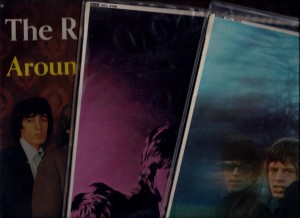A rolling stone?
I was surprised, recording digital versions of my LPs Around and around (1965), Aftermath (1966) and Between the buttons (1967) recently, how mysogynist the Stones were at the time.
It is not just “who needs yesterday’s paper, who needs yesterday’s girl”. It is “Under my thumb” (“the girl who once had her way”), and much else. It smells bad, worse than I remembered. Together with some stylted upgrading of idealized women (“my sweet lady Jane”), the main impression regarding women is that they should be distrusted and kept in command.
True, this was not the main message of the Stones – the main message was one of revolt. But it was part of the “sneering revolt” attitude. No longer the idealized love of the Beatles – love in more low-down ways.
Although the Stones got their largest hit Satisfaction from a text deriding consumer society rather than women, other hits (e g All over now) have misogynist traits. True, the Stones got some of it from the traditions they followed, but there is no mistake, they gave it a further twist too.
However – why is it that misogynist traits in music from this period sometimes go together with the best music? I don’t know. This is a private rule of mine, since it happens on several records (e g Deep Purple: “Why did not Rosemary ever take the pill”) from the 60s and 70s.
I think, perhaps it is not misogynism, this is not what actually happens in the music-making, it is more like a bit daring text, or some other element of revolt, also against women, the things close at hand, as well as society. These are actually two very different aspects, although they have often melted into one. It is only the first revolt aspect that actually engages the good music. Misogynism as a longer term proposition instead tends to stifle artistic creativity. This is my hypothesis.
Later, the Stones tackled life crises and more gender-equal relationships like everyone else, sometimes with depth and perception (You can’t always get what you want; Black and blue; I’m just waiting for a friend). But at the time, in the 1960s, they were the great “opposition” to the love theme of the Beatles, a more working class and less women-friendly version.
“We want Rolling Stones, Beatles go home, yeah yeah” was a slogan here in Norway. The Stones and the Beatles both stood for a new “free” sexuality. But the Stones were associated with “macho” tendencies in the youth revolt of the late sixties.
One could say, the Stones had balls, they tackled this dilemma by the horns, creating songs like Sympathy for devil. “Please allow me to introduce myself – I am a man of wealth and taste”. This is not, actually, so far from Roy Harper: I hate the white man, or other critical songs at the time. Even if it is not Leonard Cohen: Suzanne.
And there is no telling, whether things would have been better, with a more feminist attitude in the band. I think so. Yet according to the morale at the time, it could have meant a less intense, less good band. E g in the direction of the US band Bread (quite a horrible thought. Or a UK version of Jefferson Airplane – doable, but not likely in this setup). The Stones did try the psychedelic direction, including more madonna-like portraits of elevated femininity, without much success (Her satanic majesty’s request). Go back to where you sneer, seems to have been the main reaction – back to your roots.
There is the possibility that the Stones were not mainly recording their own sentiments. They were just doing their best as critical pop-rock musicians, musical journalists – more obviosly so, in songs like Mother’s little helper – recording the sentiments and happenings at the time. This is not all there is to it, but it does connect to a major part of the code at the time, and deserves a hearing.
Together with the assumed “misogynist” texts we find much youthful suffering and will to establish a relationship (e g Time is on my side). The so-called misogynist statements are partly derived from an older blues context and should be seen in a wider context. At the time, it was age and class rather than gender that governed the attentions of the day. The Stones’ early output was part of an age revolt, a youth counterculture, not a gender revolt.
Even so, however, the background misogynist pattern, and the chosen “sneering difference” from the more optimistic love message of the Beatles and others, become more obvious, listening to their 1965-67 albums once more, in 2014.
[NOTE: Raewyn Connell and Michael Kimmel have mailed comments to this text – to be updated]



